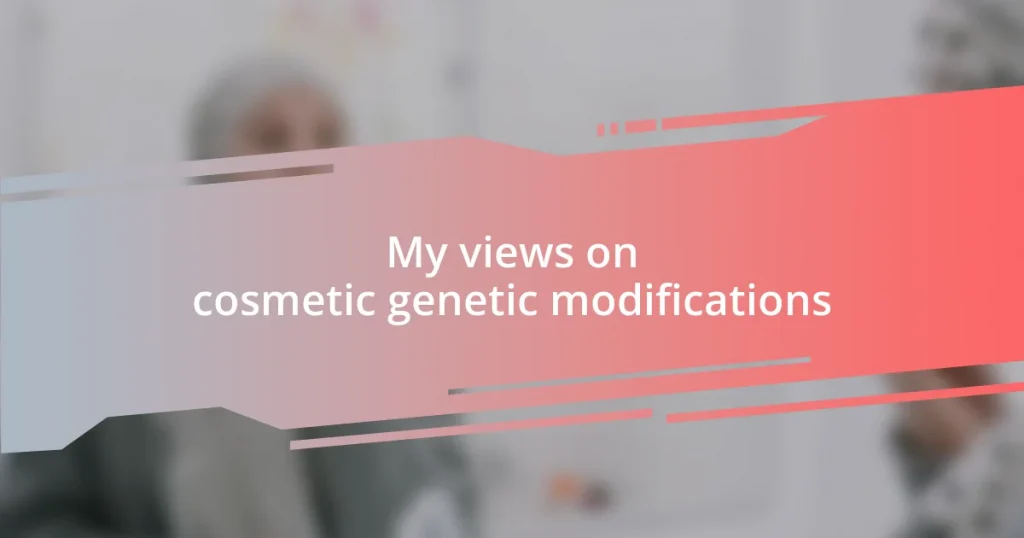Key takeaways:
- Cosmetic genetic modifications raise complex ethical questions about societal beauty standards, individual identity, and access inequality.
- Current trends include the popularity of gene editing tools like CRISPR, personalized medicine, and growing public awareness of the ethical implications.
- Future enhancements may create a genetic divide based on socioeconomic status, prompting significant societal debates about the impact on self-acceptance and the definition of beauty.
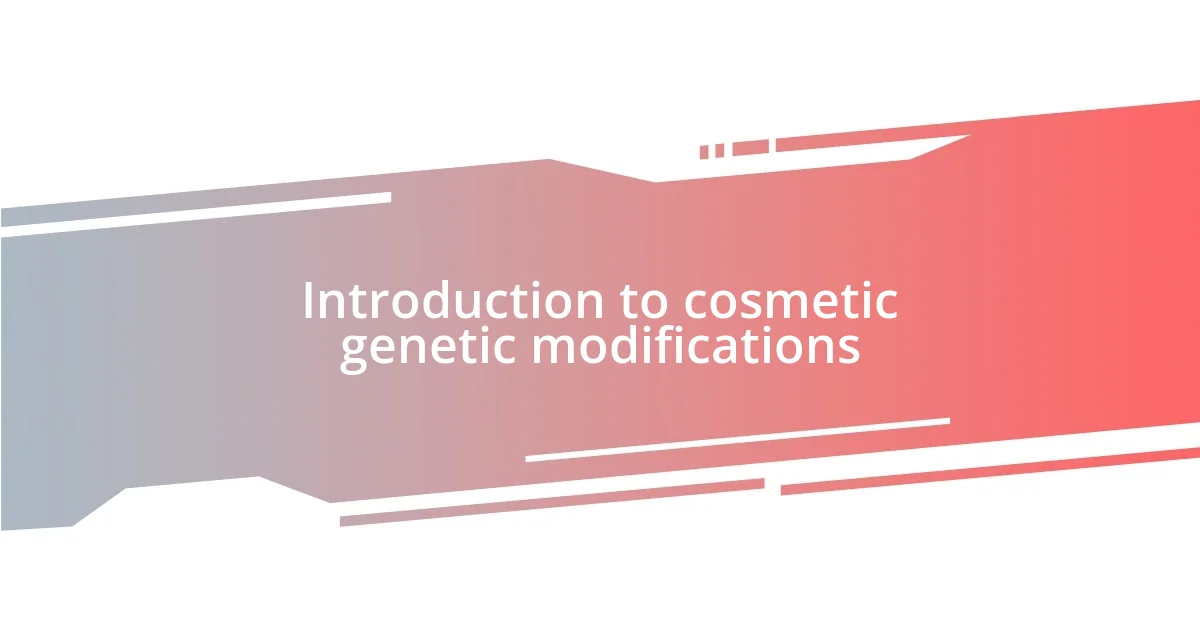
Introduction to cosmetic genetic modifications
Cosmetic genetic modifications represent a fascinating intersection of science and beauty, where genetics meets our desire to enhance or alter our appearance. I often find myself pondering the implications of such advancements. Could tweaking our DNA one day lead not only to improved aesthetics but also to increased self-confidence?
I vividly recall a conversation I had with a friend who was considering genetic modification to eliminate a hereditary skin condition. Her excitement was palpable, but so were the ethical questions tangled in her decision. It made me realize just how personal and complex this topic is—we are not just altering genes; we are impacting lives, self-esteem, and perceptions of beauty.
As advancements in gene editing technologies, like CRISPR, become more accessible, the potential for cosmetic applications only grows. What does it mean for our society when beauty can be genetically engineered? Each of us may have different feelings about the implications, but it’s clear that this conversation is just beginning.
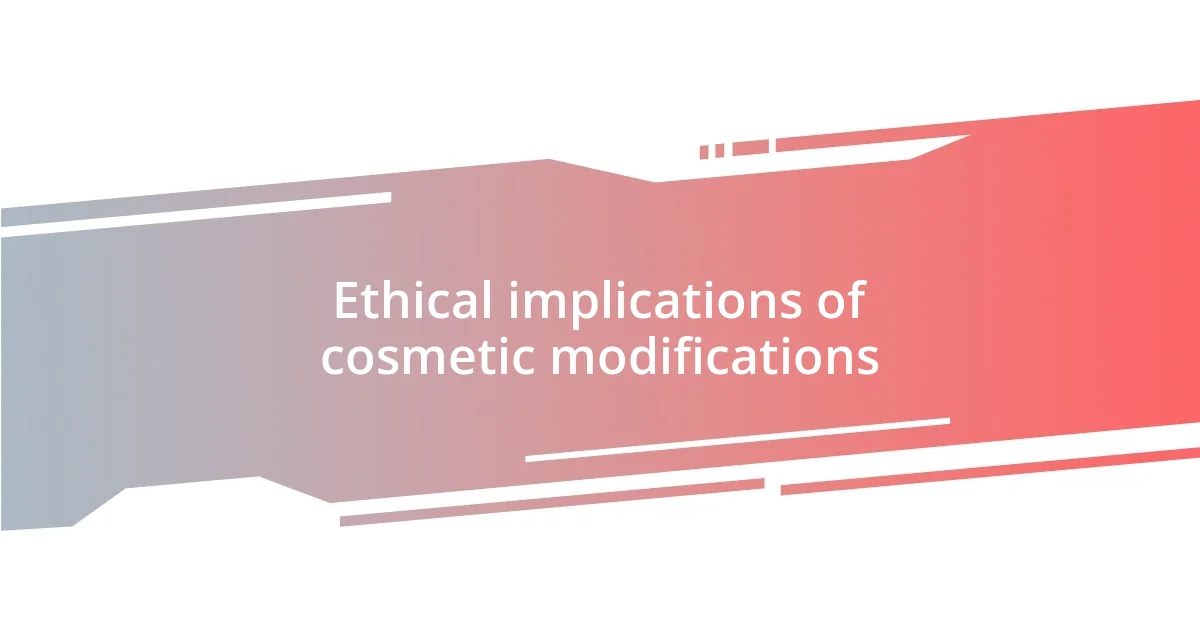
Ethical implications of cosmetic modifications
The ethical implications surrounding cosmetic modifications are profound and complex. As I think about it, I can’t help but feel a sense of unease. Imagine a world where beauty standards could be genetically engineered; it raises questions about societal expectations and individual choice. Would we risk creating a culture that values appearance over other attributes, like character or intellect? I often reflect on the potential pressure individuals might feel to conform to genetically designed ideals, which could amplify insecurities rather than alleviate them.
In a personal story, I once had a friend who openly discussed her desire to use genetic modifications to enhance her appearance. While she was excited about the prospects, I sensed her fear of judgment and societal pressures looming over her decision. It made me question the extent to which we should allow science to shape our identities. The line between enhancement and conformity seems impossibly thin, and it’s important to recognize how these modifications could affect community perceptions and interpersonal relationships.
Moreover, there’s a real concern about access and inequality. If cosmetic genetic modifications become a privilege only for the wealthy, how might that impact societal divides? I can envision a future where beauty is yet another marker of social status. This situation could raise moral questions about fairness and equity that we, as a society, must confront head-on.
| Aspect | Implication |
|---|---|
| Societal Pressure | Potential for heightened conformity to beauty standards. |
| Individual Identity | Modification could blur lines between authenticity and artificiality. |
| Access Inequality | Wealth could dictate who can enhance their appearance, widening social divides. |
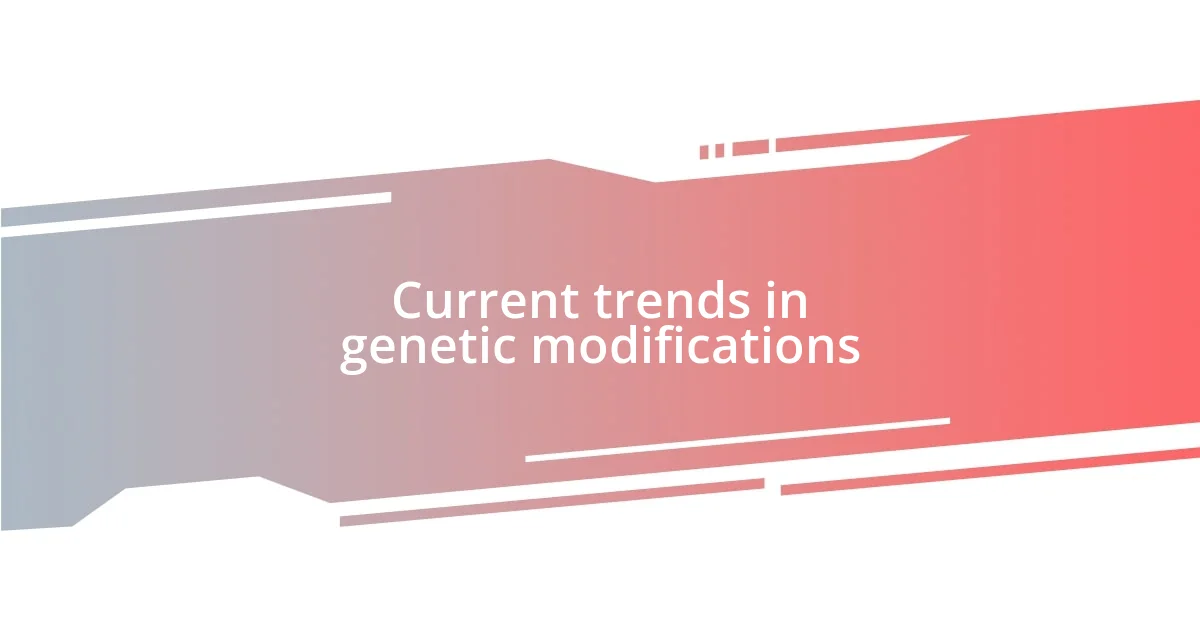
Current trends in genetic modifications
As I delve deeper into the current trends in genetic modifications, it’s remarkable to see how rapidly the field is evolving. The popularity of gene editing tools, particularly CRISPR, has made headlines not just in scientific circles but also among beauty enthusiasts. It’s as if a new frontier is opening up, and I can’t help but wonder about its implications on our everyday lives.
- The rise of personalized medicine and its crossover into beauty treatments.
- Growing interest in gene therapies targeting specific cosmetic concerns, like hair loss and skin aging.
- Increased awareness and participation in public discussions about ethical implications.
- Development of consumer-friendly genetic testing kits that allow individuals to explore their genetic predispositions.
Reflecting on conversations I’ve had with peers, many express excitement mixed with apprehension. One friend mentioned how a simple test could reveal her potential for premature aging, and she felt empowered yet anxious about the choices that information might spur. It’s a testament to the delicate balance between knowledge and the pressure to act. As we navigate through this fascinating yet daunting terrain, the emotional landscape that accompanies these advancements adds another layer of complexity.

Potential risks and benefits
When I think about the potential benefits of cosmetic genetic modifications, I can’t help but feel a glimmer of hope. Imagine having the tools to enhance someone’s self-esteem by addressing concerns like hair loss or skin conditions through targeted genetic therapies. These advances could lead to healthier, more confident lives, allowing individuals to embrace their appearance more than ever before. But, is this too good to be true?
However, the risks of this powerful technology linger eerily in the background. A friend once mentioned her fear of unforeseen health consequences stemming from genetic enhancements, a concern that resonates with me. What if a supposedly safe modification led to new health problems later on? The uncertainty surrounding the long-term effects of these procedures makes me uneasy, and it raises the question of whether we are truly equipped to handle the consequences of such profound changes to our biology.
Then there’s the issue of consent, especially for those who may not fully understand the implications. I vividly recall a discussion I had with a young student who was fascinated by genetic modifications, yet she expressed feeling overwhelmed by the potential choices. It made me realize how vital informed consent is; without it, we might venture into uncharted territory where personal agency is compromised. Are we ready to navigate these complex waters, or are we simply caught up in the allure of cosmetic enhancements?
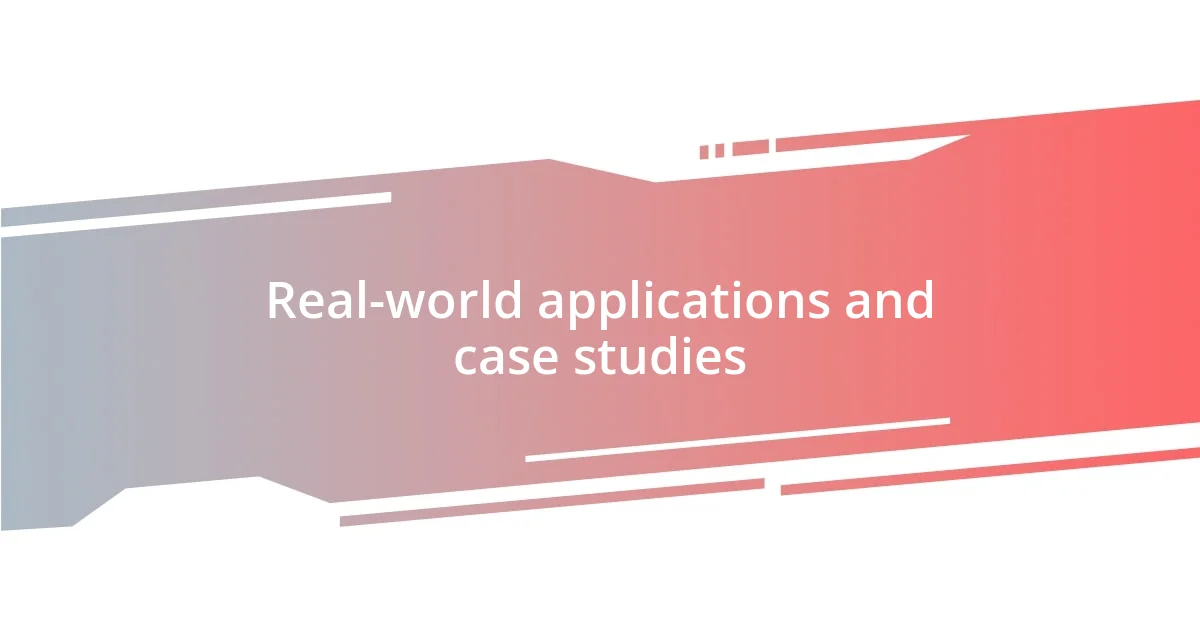
Real-world applications and case studies
The exploration of cosmetic genetic modifications has already produced some fascinating case studies. For instance, consider the work being done in clinics that offer solutions for hair loss through gene therapy. I remember a documentary showcasing a man who underwent such treatment. He not only saw significant improvement in his hair density but also reported a newfound confidence that transformed his social interactions. It made me think about how powerful these modifications can be in someone’s life.
Another intriguing application comes from a lab focusing on skin rejuvenation techniques that utilize genetic editing. I stumbled upon testimonials from individuals who participated in trials and experienced remarkable improvements in skin texture and elasticity. One woman shared her emotional journey, revealing how her aging skin affected her relationships. It struck me how deeply intertwined our appearance can be with our self-worth and social engagement.
However, with these advancements, I often ponder the ethical landscape surrounding them. Are we crossing a line when it comes to enhancing beauty? A conversation with a colleague left me feeling conflicted. He argued that while the technology offers innovative solutions, we must also consider the societal pressures that could arise from these changes. What does it mean for future generations if cosmetic perfection becomes the new standard? These questions linger in my mind, urging a deeper conversation about balance in the world of cosmetic genetic modifications.
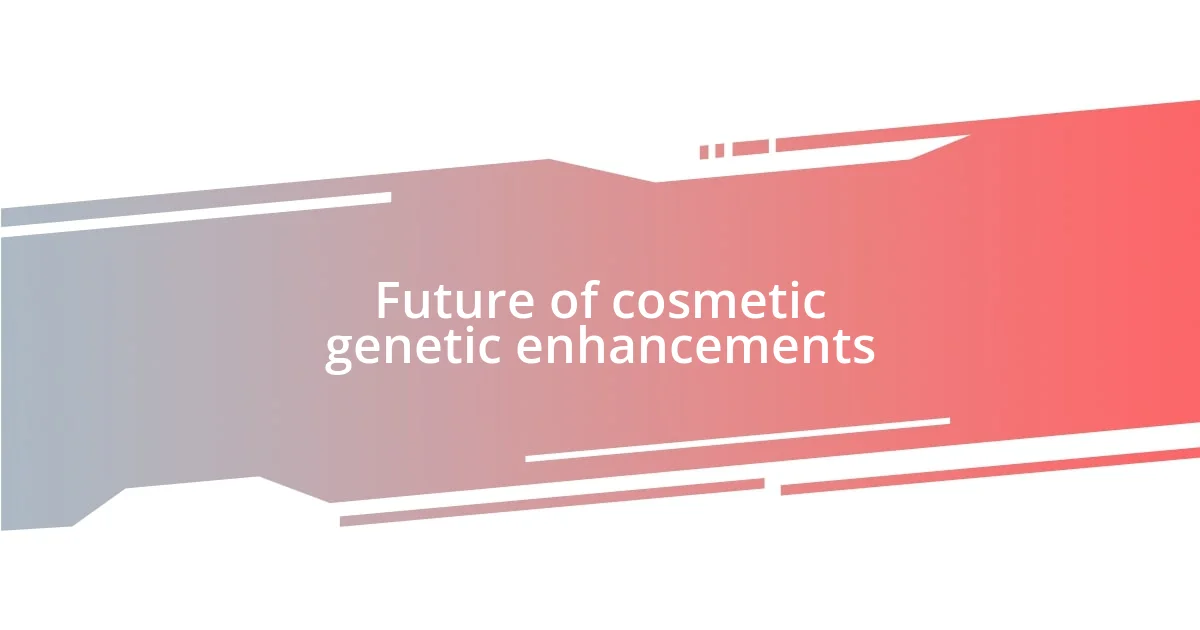
Future of cosmetic genetic enhancements
I often find myself wondering how the future of cosmetic genetic enhancements will shape our perceptions of beauty. Imagine a world where genetic modifications become so commonplace that they’re as ordinary as changing a hairstyle. It sounds exciting, but what does that mean for our unique identities? When I see young people today already grappling with beauty standards fueled by social media, I can’t help but feel concerned. Will these enhancements further deepen the chasm between self-acceptance and societal expectations?
As I envision advancements in this field, it’s hard to shake off the thought of accessibility. Just last week, I was chatting with a friend about how affluent individuals might have a head start in accessing these procedures. Will we eventually see a genetic divide in society based on who can afford cosmetic enhancements? This disparity is troubling, and it makes me question whether the benefits of such modifications will be available to everyone or just a select few.
Looking forward, I perceive a strong likelihood that cosmetic genetic enhancements will prompt significant societal and ethical debates. I remember attending a seminar where the discussion centered around what it means to “play God” by altering our genes for beauty. It sparked a passionate exchange, highlighting how our relationship with technology might redefine concepts of normalcy and desirability. How do we strike a balance between embracing innovation and preserving our humanity? As we step into this uncharted realm, those conversations will become crucial for shaping a future we can all feel comfortable living in.










